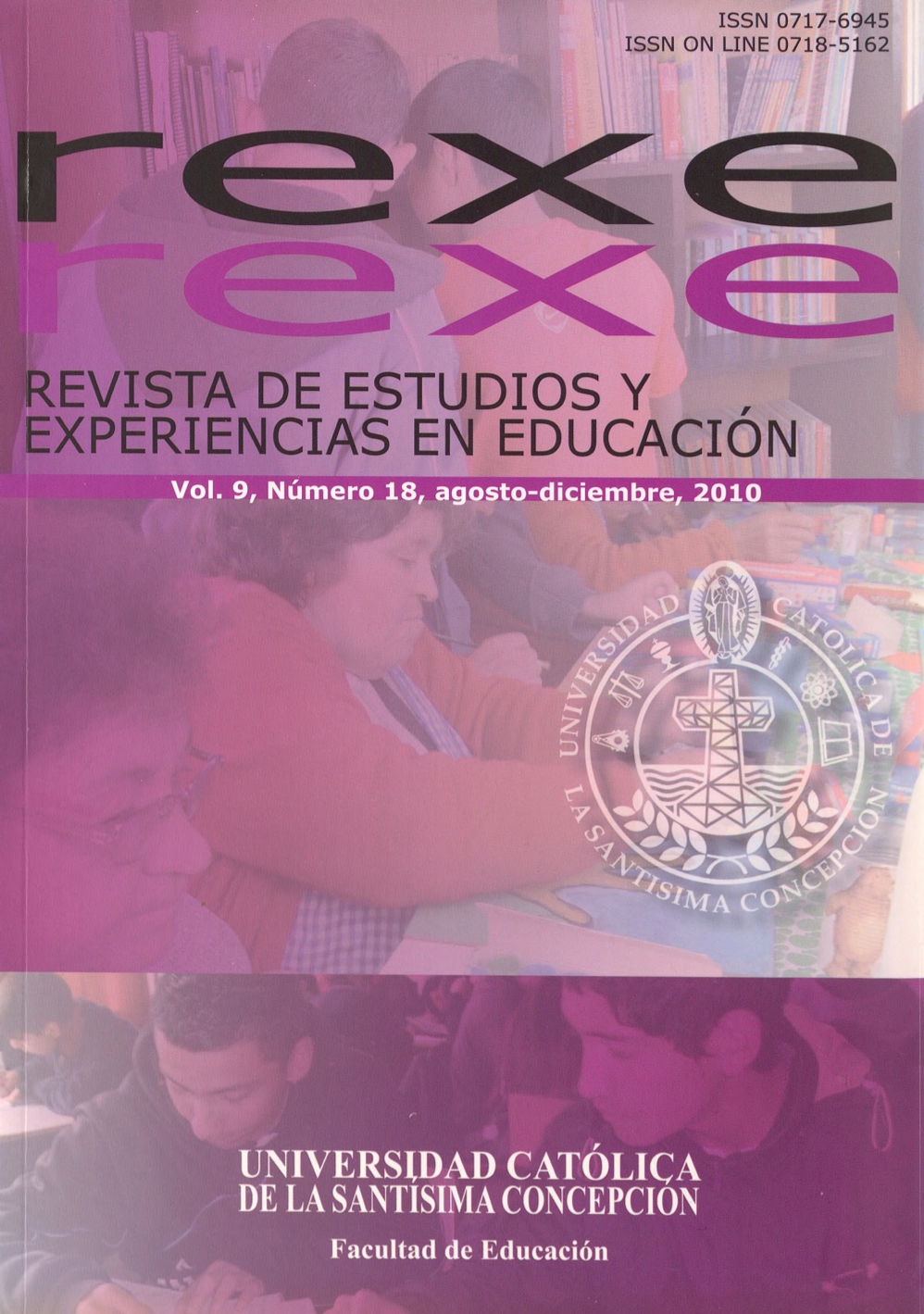Conocimiento conceptual y dificultades en la resolución de problemas verbales aritméticos en el nivel inicial
Resumen
En la presente investigación se ha pretendido establecer el grado de correlación entre las variables en estudio, por una parte (1) la habilidad para resolver problemas verbales de estructura aditiva y, por otra parte, (2) el nivel de desarrollo del conocimiento conceptual a partir de la evaluación de la conmutatividad, la composición aditiva y las relaciones parte-todo (compensación y covariación). La hipótesis de trabajo propone que los niños de 6 y 7 años que presentan un mejor nivel de desempeño en tareas de resolución de problemas presentan también un mayor nivel de desarrollo de su conocimiento conceptual. Los resultados obtenidos permiten afi rmar que se aprecia una correlación lineal entre la resolución de problemas y el conocimiento conceptual positiva (0.753) y estadísticamente significativa (v-p < 0.05).
Palabras clave: Resolución de Problemas Aritméticos, Conocimiento Conceptual, Matemática Inicial.
Descargas
Referencias
BAROODY, A. (1987): the development of counting strategies for single-digitaddition. Journal for Research in mathematics Education, 18, 141-157.
BAROODY, A. (1988): Children’s Mathematical Thinking: A developmental Framework for Preschool, Primary, and Special Education Teachers (tra. cast.: El pensamiento matemático de los niños: un marco evolutivo para maestros de preescolar, ciclo inicial y educación especial. Madrid, Aprendizaje Visor, 1997).
BAROODY, A. (1998): Fostering Children’s Mathematical Power. Mahwa, New Jersey, Lawrence Erlbaum Associates.
BAROODY, A. (1993): Fostering the mathematical learning of young children. En Spode, B. (Ed.), Handbook of Research on the Education of Young Children (151-175). New York: MacMillan.
BAROODY, A., GINSBURG, H. (1986): The relationship between initial meaningful and mechanical knowledge of arithmetic. En Hiebert, J. (Ed.), Conceptual and procedural knowledge: The case of mathematics (pp. 75-112). Hillsdale, NJ: Lawrence Erlbaum Associates.
BERMEJO, V. (1990): El niño y la aritmética. Barcelona, Paidós.
CANOBI, K., REEVE, R., PATTISON, P. (2002): Young children’s understanding of addition concepts. Educational Psychology, 22 (5), 513-532.
CANOBI, K., REEVE, R., PATTISON, P. (2003): Patterns of knowledge in children’s addition. Developmental Psychology, 39 (3), 521-532.
CARPENTER, T. (1986): Conceptual knowledge as a Foundation for Procedural Knowledge: Implications from Research on the Initial Learning. En Hiebert, J. (Ed.), Conceptual and procedural knowledge: The case of mathematics (pp.113-132). Hillsdale, NJ: Lawrence Erlbaum Associates.
CARPENTER, T., HIEBERT, J., MOSER, J. (1981): Problem structure and fi rstgrade children’s initial solution processes for simple addition and subtraction processes. Journal for Research in Mathematics education, 12, 27-39.
DE CORTE, E., VERSCHAFFEL, L. (1987): The effect of semantic structure on fi rst graders’ strategies for solving addition and subtraction word problems. Journal for research in Mathematics Education, 18, 363-381.
DOCKRELL, J., MCSHANE, J. (1997): Dificultades de aprendizaje en la infancia: un enfoque cognitivo. Barcelona, Paidós.
FUSON, K. (1992): Research on Learning and Teaching Addition and Subtraction of Whole Numbers. En Leinhardt, G., Putnam, R., (Eds.) Analysis of arithmetic for mathematics teaching (pp. 53-187). New Jersey: Lawrence Erlbaum Associates.
GELMAN, R., GALLISTEL, C. (1978): The child’s understanding of number. Cambridge, MA: Harvard University Press.
GINSBURG, H., KLEIN, A., STARKEY, P. (1998): The development of children’s mathematical thinking: Connecting research with practice. En Damon, W. (Ed.), Handbook of child psychology, Vol. 4 (pp. 401-476). New York: John Wiley & Sons.
IRWIN, K. (1996): Children’s understanding of the principles of covariation and compensation in part-whole relationships. Journal for Research in Mathematics Educations, 27 (1), 25-40.
KARMILOFF-SMITH, A. (1994): Más allá de la modularidad: la ciencia cognitiva desde la perspectiva del desarrollo. Madrid, Alianza Editorial.
LANGFORD, P. (1987): Concept development in the primary school (trad. cast.: El desarrollo del pensamiento conceptual en la escuela primaria. Barcelona, Paidós/MEC, 1989).
LINDVALL, C., IBARRA, C. (1980): Incorrect procedures used by primary grade pupils in solving open addition and subtraction sentences. Journal for Research in Mathematics Education, 11, 50-62.
MOURAO, A., COWAN, R. (1998): The emergence of additive composition of number. Educational Psychology, 18 (4), 377-390.
NUNES, T. BRYANT, P. (1996): Children doing mathematics. Oxford, England: Basil Blackwell.
ORRANTIA, J. (2002): El rol del conocimiento conceptual en la resolución de problemas aritméticos con estructura aditiva. Artículo no publicado, Universidad de Salamanca.
RESNICK, L., FORD, W. (1998): La enseñanza de las matemáticas y sus fundamentos psicológicos. Madrid-Barcelona, MEC-Paidós.
RILEY, M., GREENO, J., HELLER, J (1983): Development of children’s problemsolving ability in arithmetic. En Ginsburg, H. (Ed.), The development of mathematical thinking (pp. 153-196). New York: Academic Press.
SOPHIAN, C., MCCORGRAY, P. (1994): Part-whole knowledge and early aritmethic problem solving. Cognition and Instruction, 12(1), 3-33.
SOPHIAN, C., VONG, K. (1995): The parts and wholes of arithmetic story problems: developing knowledge in the preschool years. Cognition and instruction, 13 (3), 469-477.
VERSCHAFFEL, L., DE CORTE, E. (1997): Word Problems: A vehicle for promoting authentic mathematical understanding and problem solving in the primary school?. En Nunes, T. Y Bryant, P. (Ed) Learning and teaching mathematics: an international perspective (pp 69-97). Hove, UK: Psychology Press.
Descargas
Publicado
Número
Sección
Licencia
Política de acceso abierto
Esta revista proporciona un acceso abierto inmediato a su contenido, basado en el principio de que ofrecer al público un acceso libre a las investigaciones ayuda a un mayor intercambio global de conocimiento.
Licencia
Revista REXE "Revista de Estudios y Experiencias en Educación" de la Facultad de Educación, Universidad Católica de la Santísima Concepción, está distribuido bajo una Licencia Creative Commons Atribución 4.0 Internacional.






